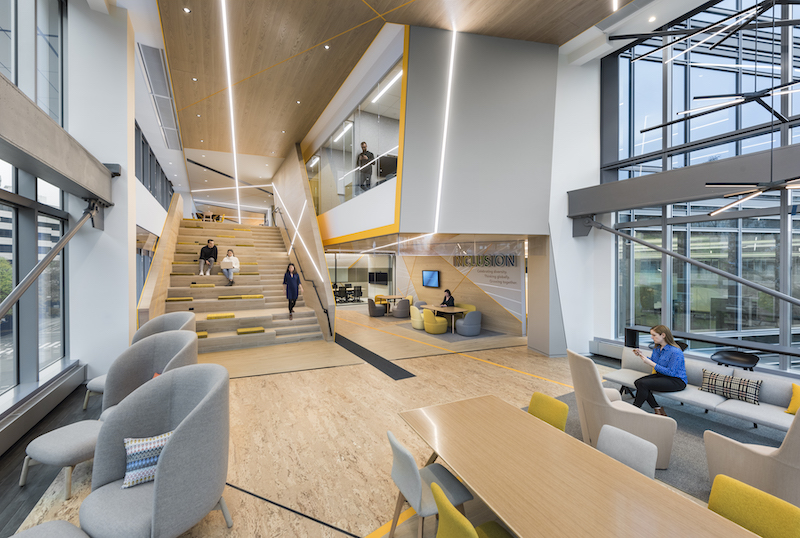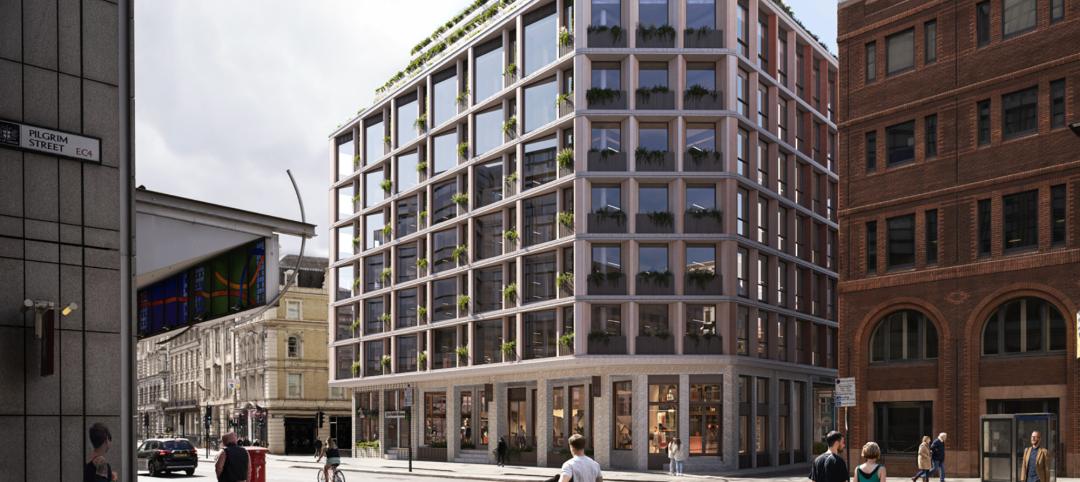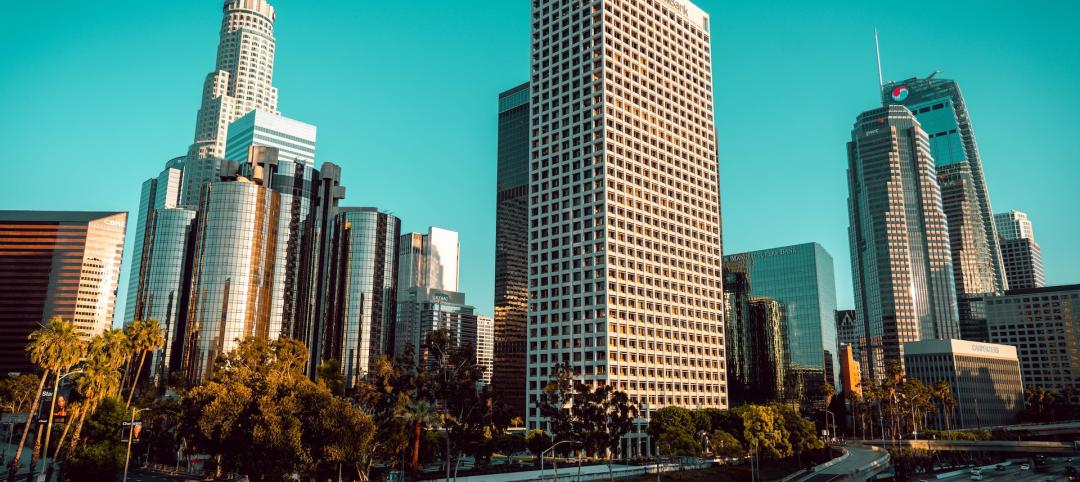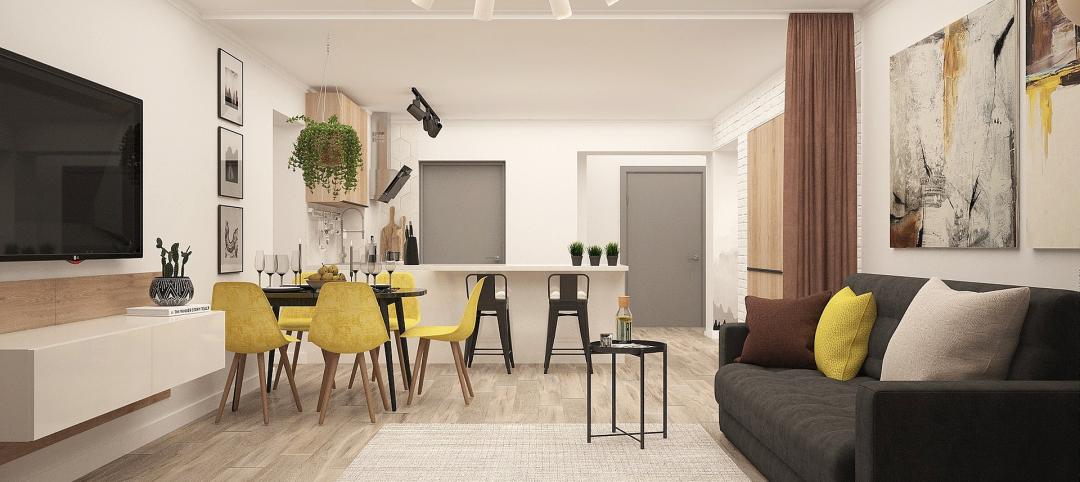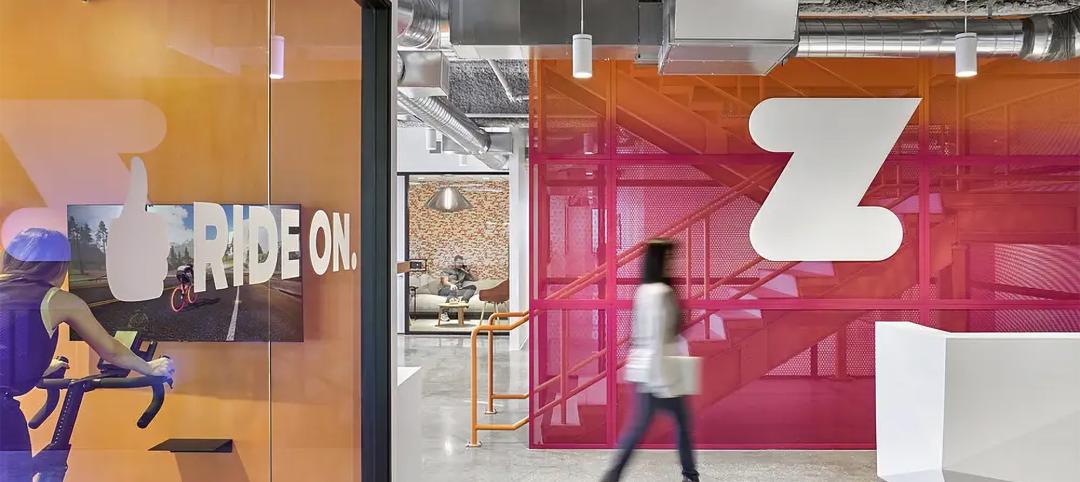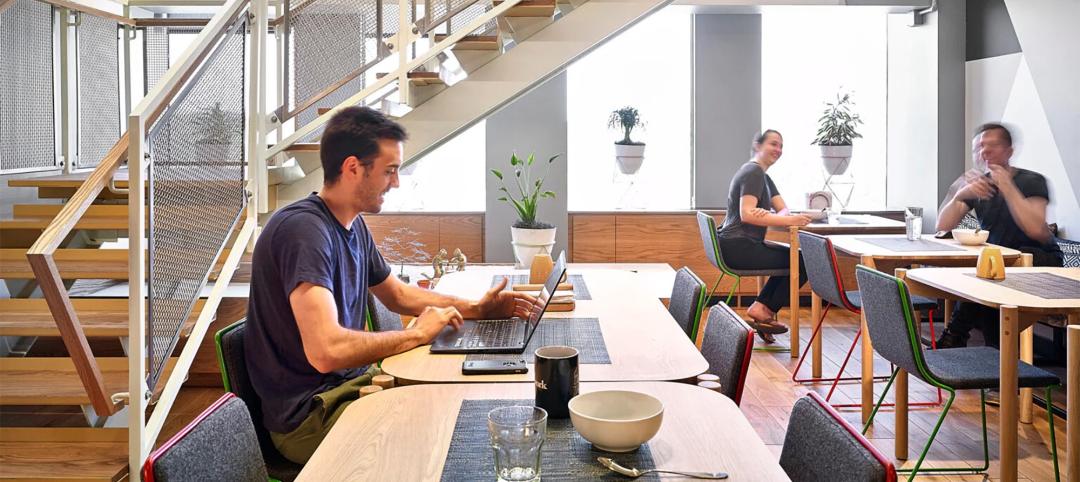Akamai is the largest distributed platform operating at the edge of the Internet. On Nov. 1, it held a grand opening ceremony for the opening of its 19-story, 480,000-sf headquarters in Cambridge, Mass., which brings employees from six properties under one roof.
Those 19 floors are connected by the Akamile, a mile-long uninterrupted path that extends from the building’s street lobby to its highest floor. Sasaki was the interior designer of this building, and its vision for Akamile was to provide areas for socialization (from high-tech conference rooms to game stations), business, and seclusion, each of which is clearly denoted with colors and furniture specific to the workspace.
The goal of the space is to get employees to want to be in the office, as opposed to working remotely. “To connect the world, we must first connect to each other” was Sasaki’s mission statement for Akamai’s headquarters.
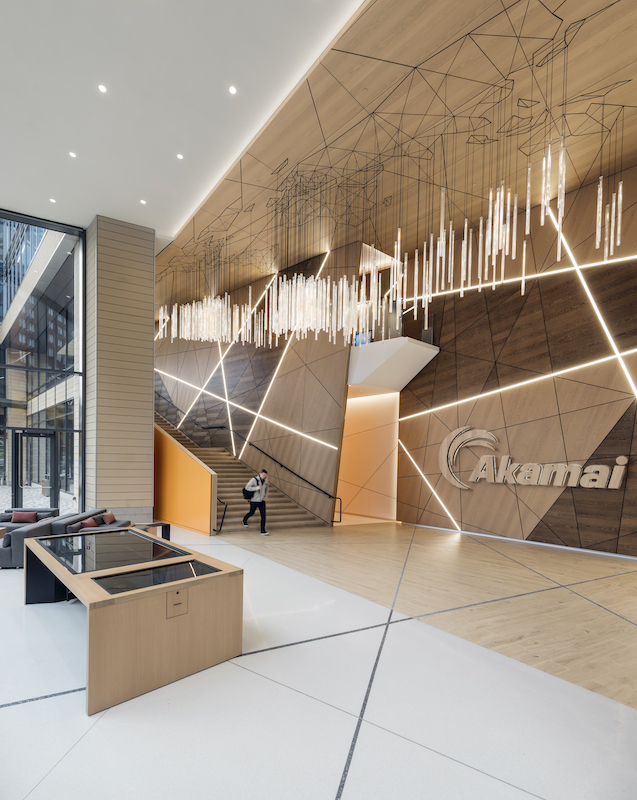
Greeters meet visitors coming into Akamai's two-story lobby.
To provide a personalized, welcoming experience, the building’s two-story lobby dispenses with a concierge desk in favor of greeters. The first three stories of the building are in “Akamai orange,” the top three in “Akamai blue,” and the rest in different color schemes that provide wayfinding for visitors as they step from the elevators. The color scheme is also meant as a directional signal to collaborative work areas.
(The color is bright in the Akamile, and subdued in workspaces. Brightness denotes when workers are in collaborative versus individual spaces.)
Sasaki developed a parametric interior design for Akamile, to generate an interconnected line pattern throughout the building. These color lines increase in spaces where connectivity and communal work are frequent.
Akamile is also used for programming. The Commons, on the third floor, includes an IT help desk, coffee bar, mail room, and supply room. Floor eight offers ping pong and pool tables, and the stairs double as shared seating. There are also moveable stairs that allow the floor space to be reconfigured.
The Building Team on this project included Boston Properties (developer and owner), Pickard Chilton (exterior design architect), Stantec (exterior AOR), and Turner Construction (interior CM). The interior construction exceeded $100 million, and Akamai has taken a 15-year lease.
At 19 stories, the headquarters is the tallest office building in Cambridge’s Kendall Square. The building includes Akamai’s new Network Operations Command Center, Broadcasting Operations Control Center, and Security Operations Center, where DDoS attacks are detected and mitigated.
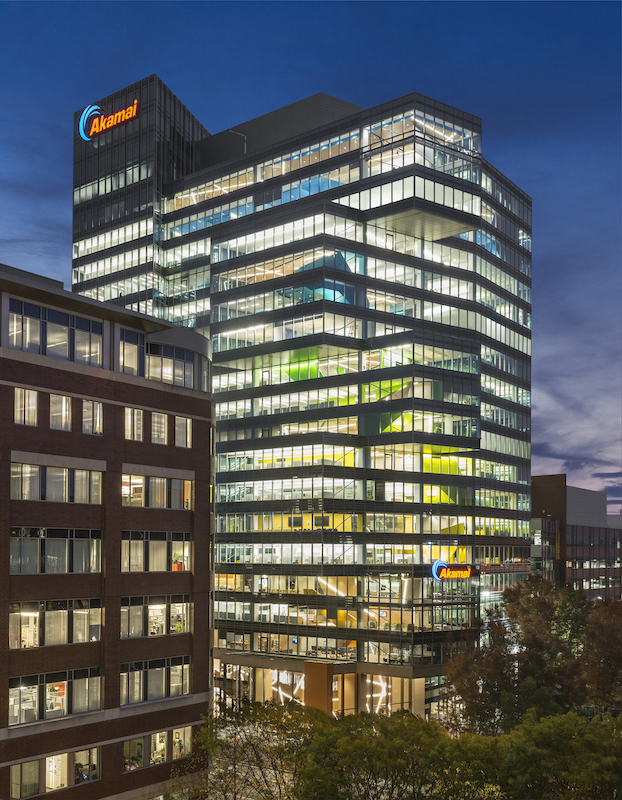
The interior buildout of the 19-story headquarters cost more than $100 million. The building was designed to achieve WELL and LEED Gold certifications.
Akamai’s headquarters is shooting for WELL certification by next summer. All foods sold in the building will include at least 50% fruit or vegetable options. At least half of the food has grain flour as their primary ingredient. Nonpackaged foods will list their ingredients.
Over 70% of the building’s workstations are within 20 feet of a window. There are electronic sit-to-stand desks, and the interior is monitored for thermal comfort. Private spaces use fabric screens to absorb sound, and all spaces are designed to limit reverberations and provide proper sound levels relative to acoustics.
The building’s operations are designed to be water- and energy-efficient: A rooftop solar panel array provides more than 82,000 kWh per year of electricity. The building’s HVAC system features active chill beans (made in Massachusetts) that are expected to be at least 30% more efficient. The building will receive LEED v4 Gold core and shell certification.
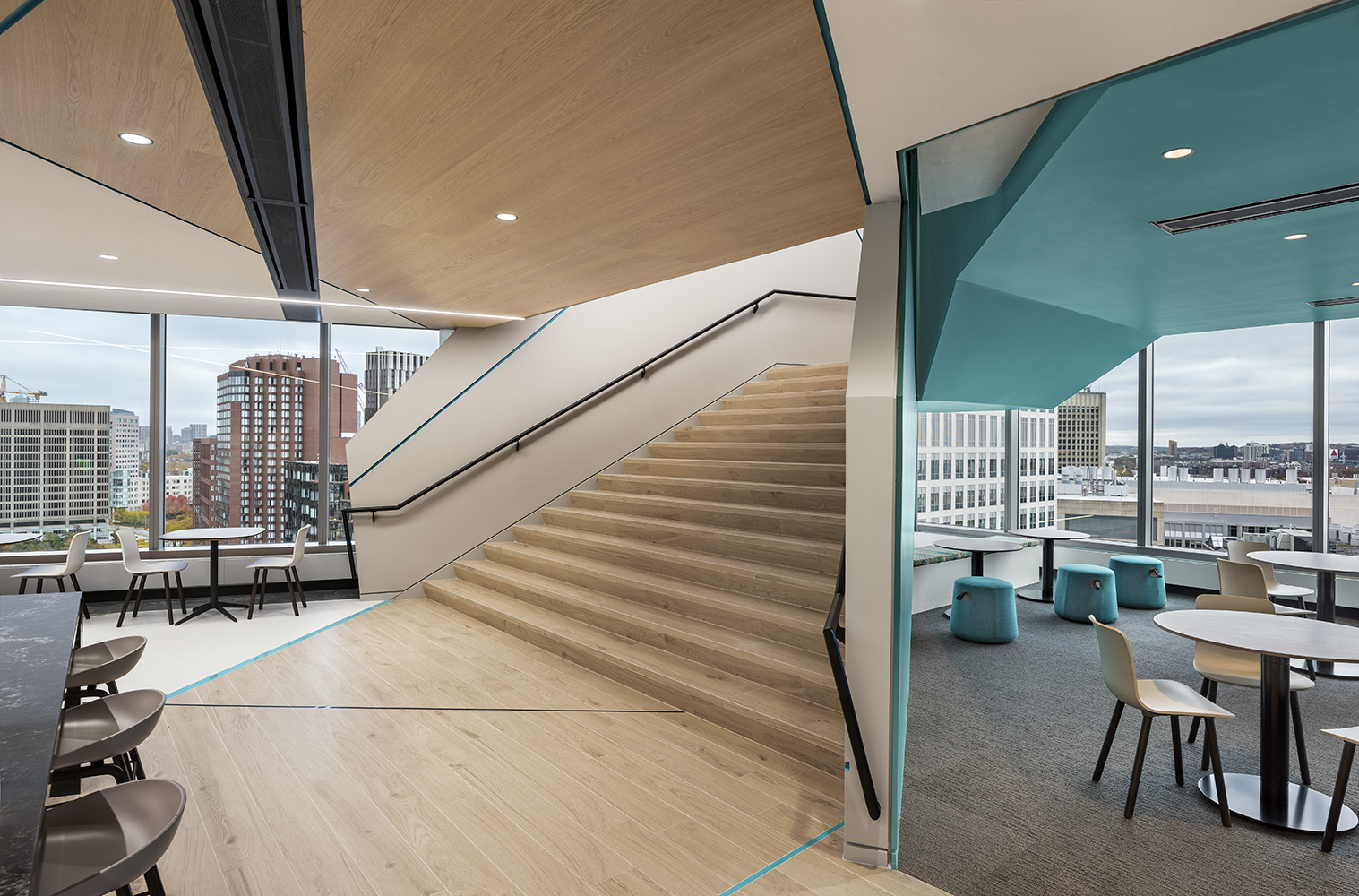
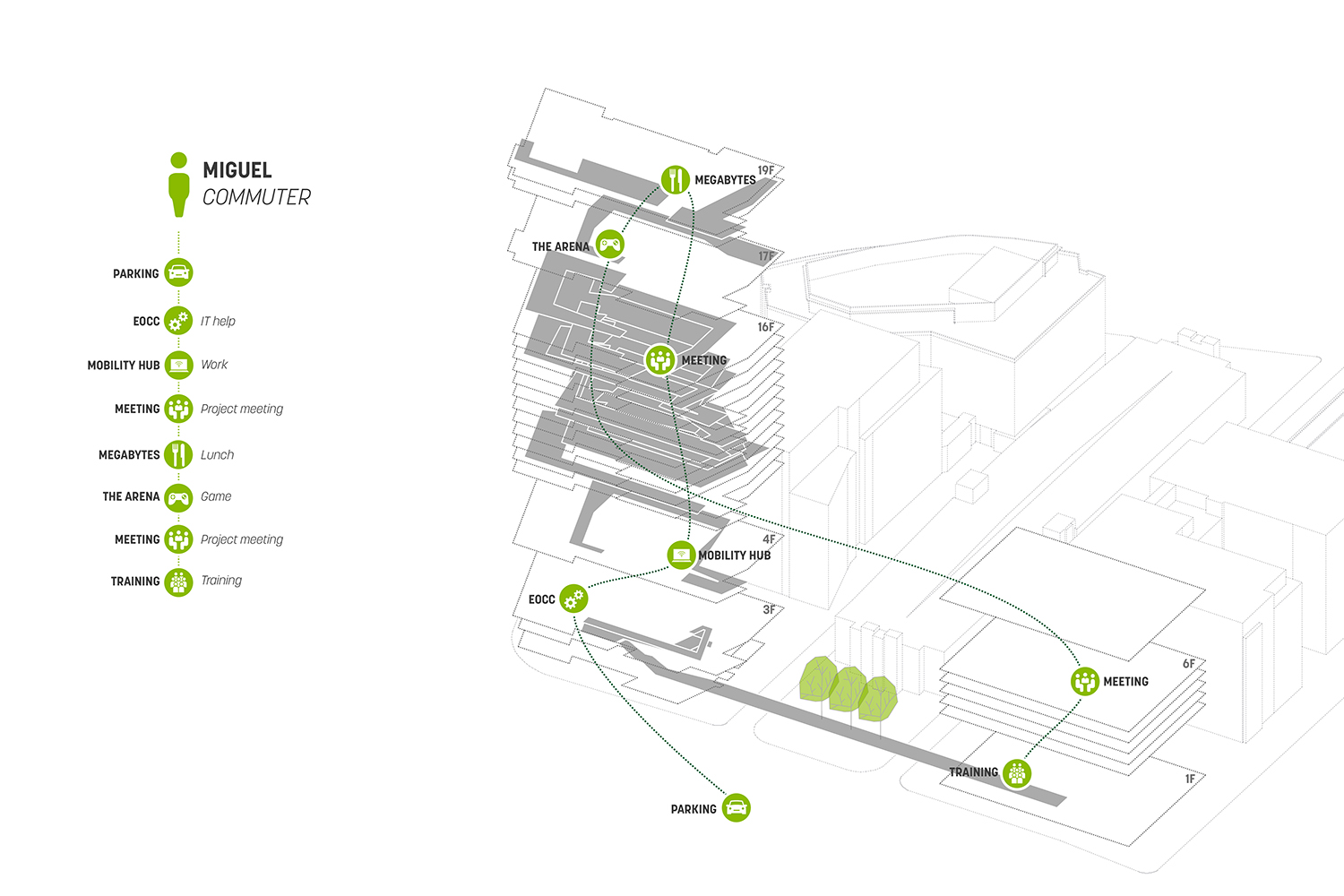
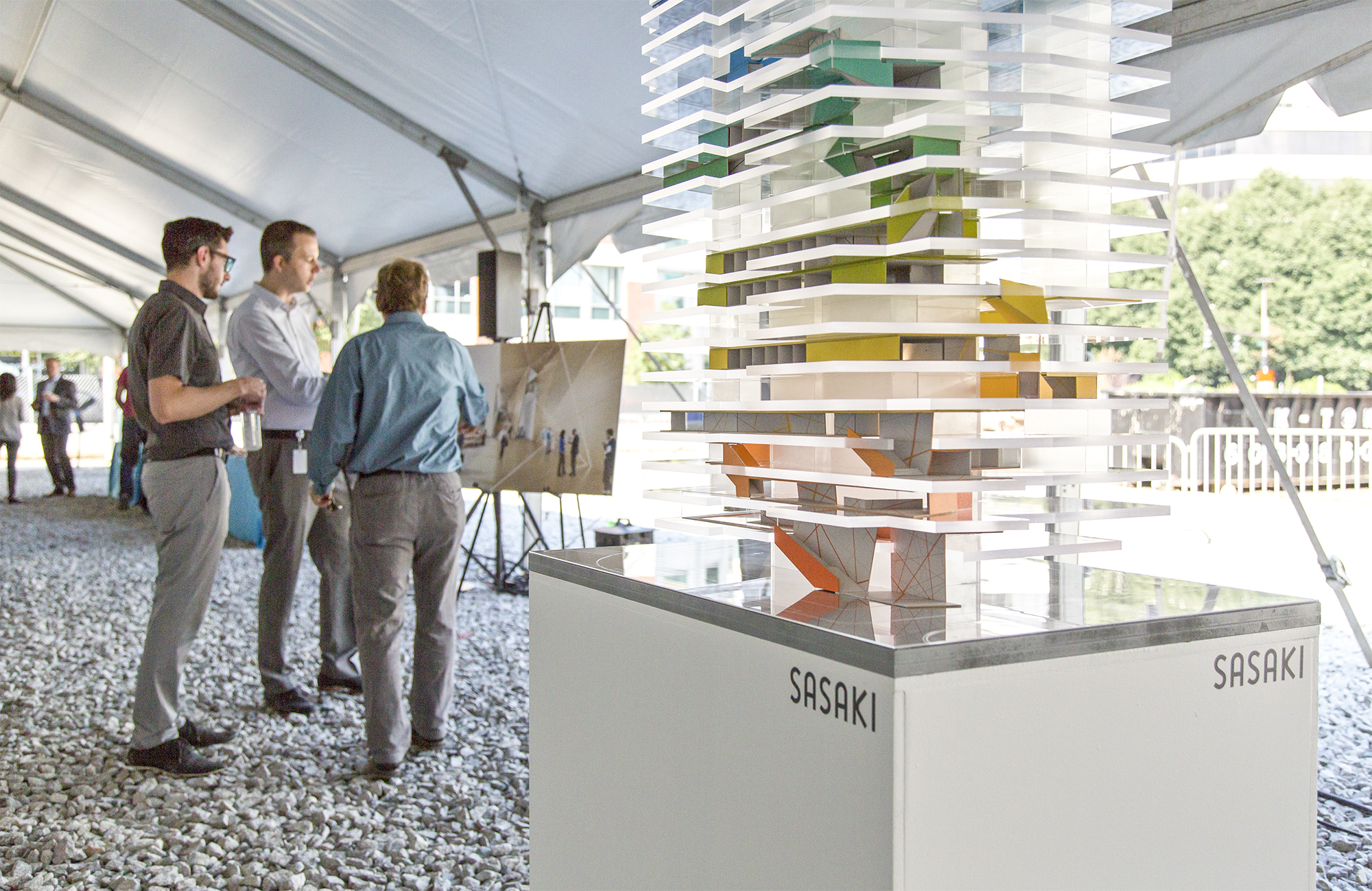
Related Stories
Codes and Standards | Jul 19, 2023
Office leasing in major markets by financial services firms rebounds to pre-pandemic norms
Though the pandemic led to reductions in office leasing by financial services firms in gateway markets, a recent report by JLL found a notable leasing resurgence by those firms.
Sustainability | Jul 13, 2023
Deep green retrofits: Updating old buildings to new sustainability standards
HOK’s David Weatherhead and Atenor’s Eoin Conroy discuss the challenges and opportunities of refurbishing old buildings to meet modern-day sustainability standards.
Government Buildings | Jul 13, 2023
The recently opened U.S. Embassy in Ankara reflects U.S. values while honoring Turkish architecture
The U.S. Department of State’s Bureau of Overseas Buildings Operations (OBO) has recently opened the U.S. Embassy in Ankara, Turkey. The design by Ennead Architects aims to balance transparency and openness with security, according to a press statement. The design also seeks both to honor Turkey’s architectural traditions and to meet OBO’s goals of sustainability, resiliency, and stewardship.
Sponsored | Fire and Life Safety | Jul 12, 2023
Fire safety considerations for cantilevered buildings [AIA course]
Bold cantilevered designs are prevalent today, as developers and architects strive to maximize space, views, and natural light in buildings. Cantilevered structures, however, present a host of challenges for building teams, according to José R. Rivera, PE, Associate Principal and Director of Plumbing and Fire Protection with Lilker.
Mass Timber | Jul 11, 2023
5 solutions to acoustic issues in mass timber buildings
For all its advantages, mass timber also has a less-heralded quality: its acoustic challenges. Exposed wood ceilings and floors have led to issues with excessive noise. Mass timber experts offer practical solutions to the top five acoustic issues in mass timber buildings.
Multifamily Housing | Jul 11, 2023
Converting downtown office into multifamily residential: Let’s stop and think about this
Is the office-to-residential conversion really what’s best for our downtowns from a cultural, urban, economic perspective? Or is this silver bullet really a poison pill?
Adaptive Reuse | Jul 10, 2023
California updates building code for adaptive reuse of office, retail structures for housing
The California Building Standards Commission recently voted to make it easier to convert commercial properties to residential use. The commission adopted provisions of the International Existing Building Code (IEBC) that allow developers more flexibility for adaptive reuse of retail and office structures.
Headquarters | Jul 5, 2023
The game room: Transforming game design office spaces
IA Interior Architects' designers discuss the aesthetic considerations for gaming industry work environments.
Office Buildings | Jun 28, 2023
When office-to-residential conversion works
The cost and design challenges involved with office-to-residential conversions can be daunting; designers need to devise creative uses to fully utilize the space.
Standards | Jun 26, 2023
New Wi-Fi standard boosts indoor navigation, tracking accuracy in buildings
The recently released Wi-Fi standard, IEEE 802.11az enables more refined and accurate indoor location capabilities. As technology manufacturers incorporate the new standard in various devices, it will enable buildings, including malls, arenas, and stadiums, to provide new wayfinding and tracking features.


